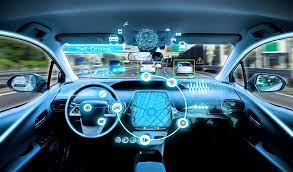
The advent of self-driving cars has long been hailed as the future of transportation, promising safer and more efficient journeys. However, as driverless technology becomes a reality in cities like San Francisco, the truth behind this utopian vision appears quite different. Reports suggest that the always-on surveillance cameras embedded in these vehicles may pose a significant risk to personal privacy. The law enforcement authorities are requesting access to footage captured by these cameras. Leading to concerns about surveillance and the violation of constitutional rights raised by experts.
[embedded content]
The Promised Vision versus the Awkward Reality
The original vision of car manufacturers and tech companies depicted self-driving vehicles as intelligent, AI-driven marvels that would enhance passenger and public safety. However, the truth has proven far from the initially portrayed idyllic scenario. These vehicles have become frequent obstacles to public safety and harbor privacy concerns that experts have long warned about.
Also Read: Didi Neuron: Futuristic Driverless Robotaxi

A recent report from Bloomberg has shed light on a disturbing reality. Waymo, a subsidiary of Google, is a significant player in the self-driving car industry. It has been subjected to law enforcement requests for the footage captured during its autonomous journeys in San Francisco. This revelation marks a troubling departure from the promised future of self-driving cars. It also raises questions about the use of surveillance technology in the automotive industry.
The Dystopian Potential: Surveillance and Privacy Experts Speak Out
As concerns about privacy and surveillance escalate, experts in the field are drawing attention to the implications of this development. Anti-surveillance activist Albert Fox Cahn is the Surveillance Technology Oversight Project Director. He warns that automotive surveillance, including the continuous recording of camera footage, can turn vehicles into tools for policing. Also emphasizing the need for car companies to invest in preventing their technology from leading society toward authoritarianism.
The Global Expansion of Driverless Technology: Data Collection and Handling
As self-driving technology extends beyond California and reaches cities in Texas, Arizona, and even global locations, understanding how companies collect, store, and handle user data becomes crucial. The expansion of driverless systems raises important questions about data privacy and the potential for misuse of user information by law enforcement agencies.
The Warrants and Subpoenas Conundrum
The collection of user data by tech companies inevitably attracts legal attention. Requests for user data through warrants and subpoenas have become inevitable in the information age. This issue extends beyond the United States, as the European Union recently established a legal framework for autonomous vehicles, potentially allowing manufacturers to collect and release data to authorities. The full implications of this provision remain to be seen.
The Cost of Personal Safety: Privacy vs. Surveillance

While companies like Waymo and Cruise assure the public of their commitment to building safe autonomous vehicles, personal safety often takes a back seat. Privacy experts stress that surveillance technology and data collection systems vulnerable to law enforcement requests disproportionately harm marginalized communities and violate constitutional privacy rights.
Cameras in the Spotlight: A Chilling Experience
The presence of cameras is integral to the functioning of self-driving systems. External cameras assist vehicles in navigating the streets, while internal cameras claim to provide customer support. However, individuals’ discomfort with constant surveillance has become evident during test drives. The sight of cameras pointed in all directions inside the car has prompted some passengers to cover their faces throughout the journey.
Law Enforcement’s Interest: Waymo and Search Warrants
Recent reports indicate that law enforcement agencies have recognized the potential value of footage captured by driverless car cameras in criminal investigations. Bloomberg’s research reveals that Waymo has been the subject of at least nine search warrants for video recordings from their autonomous vehicles in San Francisco. However, the true extent of such requests, often accompanied by gag orders, remains uncertain.
The Companies’ Response: Striving for Privacy
Waymo asserts that it reviews each law enforcement request to ensure compliance with applicable laws and legal processes. It aims to minimize data sharing and objects to overly broad requests. Similarly, Cruise emphasizes the importance of privacy and provides data only in response to legal processes or urgent circumstances where individuals’ safety is at risk.
Our Say
As the driverless car revolution gains momentum, the invasion of personal privacy emerges as a critical concern. Using surveillance cameras and collecting user data raises profound questions about the balance between safety, surveillance, and constitutional rights. Car manufacturers and technology companies must prioritize privacy protection. They must also ensure that the promises of a self-driving future do not come at the cost of personal freedoms. The ongoing debate surrounding surveillance, data privacy, and the responsible use of AI technology in driverless cars will shape the future of transportation in the years to come.
Learn More: How is AI Transforming the Automotive Industry?
Related
- SEO Powered Content & PR Distribution. Get Amplified Today.
- PlatoData.Network Vertical Generative Ai. Empower Yourself. Access Here.
- PlatoAiStream. Web3 Intelligence. Knowledge Amplified. Access Here.
- PlatoESG. Automotive / EVs, Carbon, CleanTech, Energy, Environment, Solar, Waste Management. Access Here.
- BlockOffsets. Modernizing Environmental Offset Ownership. Access Here.
- Source: https://www.analyticsvidhya.com/blog/2023/07/driverless-cars/



